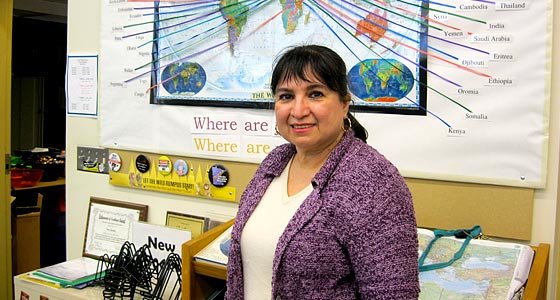Sixty percent of their students have never attended school before
 Rose Santos, principal of the Limited English Achievement Program High School. (Photo by Jan Willms)[/caption]
Rose Santos, principal of the Limited English Achievement Program High School. (Photo by Jan Willms)[/caption] By JAN WILLMS
You’re a teenager in a new country where you don’t know the culture, the customs or the language. You may have left a place that was ravaged by war, and you have not had the chance to go to school before. Everything is new and different, and a bit scary.
The Limited English Achievement Program (LEAP) High School provides that safe place where you can learn and grow and become accustomed to your new home while earning your diploma.
The school, currently housed in the Wilson Building at 631 Albert St. N., has been at this location since 2003. It began in 1994 on the 4th floor of the 494 Sibley Ave, building. It initially shared its present location with the Wilson Middle School, but during the summer of 2004, LEAP took over the entire building.
“We draw students from all around the globe,” said Rose Santos, who has been the school’s principal since 2004. “Our students usually come to us with not very much English,” Santos said. “Many come from war-torn places, and 60 per cent of them have not attended school before.”
The school’s mission is to be a national leader in preparing immigrant students to become global citizens and critical thinkers. Santos said 100 per cent of the students are refugees or immigrants.
LEAP is designed to provide an engaging school experience, bridge cultural and language barriers, meet individual learning needs and build English language fluency, so that all students graduate prepared for a positive role in society.
Over 400 students in grades 9-12 currently attend LEAP.
“Our average class size is 19,” Santos said. “The largest class has 27 students.”
She said that 85 per cent of the students who graduate go on to post-secondary education.
“I think our students are motivated to be the best that they can be,” Santos declared. “They know they need to learn English to be successful.”
LEAP follows the St. Paul Public Schools regulations for requirements and for issuing credits for graduation.
“We have extremely fabulous teachers who get to know the kids very well,” Santos continued. “A lot of my teachers are dual-licensed in ESL and another academic subject.”
Santos herself is licensed to teach elementary, ESL K-12 and special ed, as well as having her principal’s license.
All the classes are taught in English. Santos said there are also bi-lingual staff members or teaching assistants who come in to help with the students.
“The students learn English and other information at the same time,” Santos explained. “For example, they might learn writing and take a computer course at the same time, or study reading and learn social studies or science. They do two things at once.”
The students may be dealing with emotional issues as well. “Some have lost their whole families,” Santos noted. “Some are young adults, working at night and going to school during the day, getting only a few hours of sleep. Our school social worker is busy trying to find services for our students.”
She said that for her, the biggest challenge of the program is when some students reach age 21 and age out before they have gotten their diploma. “That’s very heartbreaking for me, when they are so close to graduating,” she said.
The most positive aspect of the school for her is seeing students complete their studies and attain their diploma, then return as volunteers while they are attending college.
“What’s even more rewarding is that every time a new group comes, we learn more,” Santos said. “We have had groups of Hmong, Somali, Spanish-speaking and Karen. Every few years, there is somebody new and we learn about a new culture.”
She said that LEAP provides a path of survival for many students.
“We try to have a warm, welcoming environment that is acceptable of the cultures they bring,” Santos stated. “We want our students to feel at home, socially and emotionally.”
A lot of relationship-building happens among students, teachers and staff, according to Santos.
“We’re a small school, and we know our students well,” she said. She explained that even though some of the students come from countries that are enemies of each other, when they arrive at LEAP that racial tension is not present.
She said that LEAP students realize there are many stereotypes about new immigrants, and they worked on a project that discounted the negative thoughts and instead emphasized the positive aspects of their cultures and of them as individuals.
The students made a video in which they acted out various strengths that they, as immigrants and refugees, bring to their new home. And on their arms and faces and legs, they wrote these strengths: determination, peace, love and helpfulness, among others.
Santos stressed how important education is to the students and their parents.
“Here, we take it for granted that we can get an education,” she said. “In some of the countries our students come from, only the rich can attend school. When they come here and get this gift of education, they truly appreciate it.”
Comments
No comments on this item Please log in to comment by clicking here